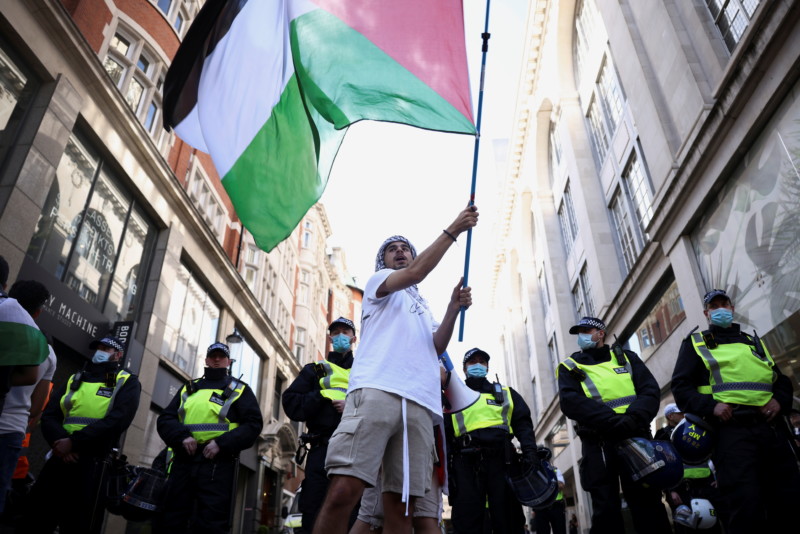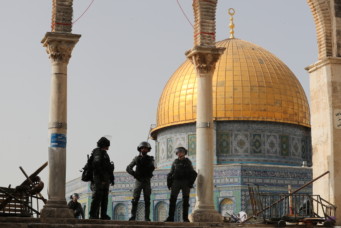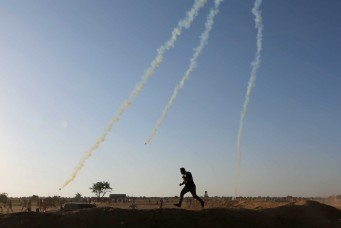This Watershed Moment for the Land(s) between the River and the Sea
The recent war between Israel and Hamas has transformed the moral calculus of the Israeli-Palestinian conflict.

Though it lasted a mere eleven days, the battle in Gaza and across Palestine managed to dislodge an iceberg worth of support Israel had built up in the preceding decades. We are witnessing a transition that has radically shifted Israel’s relations in the region and beyond.
Not only did the world watch in horror as the highrises of Gaza fell and thousands of civilians lost their homes while hundreds more died; but relations between Israel and its Palestinian citizens suffered an irreparable fracture. The inter-ethnic violence raged in a way never before seen. The Gaza battle also renewed a sense of solidarity between Israeli Palestinians and their brothers and sisters in the West Bank and Gaza.
Relations between Israel and the United States have also begun a fundamental realignment. Despite the power of the U.S. Israel Lobby to control the domestic debate and promote a pro-Israel narrative, new voices of opposition have become emboldened. In fact, the progressive Democratic caucus played a critical role in rallying opposition to the Israeli assault. A short, but critical meeting between U.S. president Joseph Biden and Muslim-American House member Rashida Tlaib on an airport tarmac moved Biden to demand that Israel agree to a ceasefire. Not since the days of the first George Bush administration has a president been willing to force Israel’s hand in this manner.
Unlike in past Israeli-Palestinian conflicts, in which both parties shared blame, this time the fault clearly lay with Israel. It provoked the incidents that eventualy built up to full-scale combat by harassing and then violently assaulting Muslim worshippers at the holy Al Aqsa mosque during the month of Ramadan.
Saving Bibi
The Israeli government’s assault was motivated by purely cynical political reasons: to save Netanyahu’s career. The day after his political rivals had sealed an agreement to form a new government which would have excluded him, Netanyahu commenced the bombing. He knew the anti-Netanyahu coalition, containing factions from the far-right to the left, could not remain united in face of war. He was right. The key far-right leader, Naftali Bennett, announced he could not join in the midst of hostilities. In addition, the Islamist Party, Raam, which would have joined the coalition for the first time in Israeli history, also could not do so as long as there were anti-Palestinian pogroms on the streets of Israeli towns.
Moreover, Netanyahu is also in the midst of a major corruption trial. If he is found guilty, he would go to prison and forfeit his role as prime minister. He knew that no court would convict him as long as the country was at war. As long as he remained the country’s leader, his apparent logic was that he might devise a legislative or legal stratagem to avoid punishment.
Thus, this war had no strategic or defensive purpose. It was a war to protect Netanyahu’s personal interests and political power. The cynicism of this charade has not been lost on the world nor even on Israelis themselves.
Before the bombing began in Gaza, Netanyahu had tried and failed to form a new coalition which he planned to lead. The mandate had then fallen to his rival, Yair Lapid. The only way to frustrate Lapid’s attempt, which almost succeeded at that time, was to provoke the attack.
Though Netanyhau’s tactic worked in the short term, it ultimately failed. In the weeks since the ceasefire, Lapid has cobbled together a new government. Lapid’s coalition will remove the longest-serving prime minister in Israel’s history. So, the soon-to-be ex-prime minister’s war on Gaza was a corrupt, ultimately failed effort to maintain power; at the expense of 265 Palestinian lives, among them 67 children.
The world saw this stratagem for the deal with the devil that it was. As a result, Israel lost whatever moral high ground it had ever enjoyed and was left exposed as a nation engaged in war crimes against an essentially defenseless civilian population.
The War at Home
For the first time in Israel’s history of Palestinian conflict, the hostilities began not with events in Gaza, but with domestic turmoil at home. As a result of the naked assault by Israeli Border Police on Haram al Sharif, Israeli Palestinian communities throughout the country rose up in anger. They rioted, assaulted Israeli Jews, burned a Lod synagogue, and trashed Jewish businesses.
In response, Jewish vigilantes led by extremist settlers flooded into these towns to confront the Israeli Palestinians. These vigilante groups hunted Palestinians down, looted Palestinian businesses, threw firebombs into family homes, and beat victims senseless in the streets as police stood by. In one incident, they even beat a man they believed to be Palestinian with poles draped in Israeli flags. This pole attack was made darkly ironic when the media later learned that the victim was a Mizrahi Jew.
In these Arab-majority quarters, the residents retreated to their homes, locked their doors, and tried to wait out the terror that ensued.
Not since the Nakba had Palestinian citizens of Israel feared for their lives from the onslaught of their Jewish neighbors. Of course, they had suffered their second class status within the majority-Jewish state largely in silence. During previous Israeli invasions of Gaza, they maintained a studied neutrality. They dared not express their feelings of solidarity publicly, if they had them, for fear of disturbing the tenuous inter-ethnic compact that permitted them to exist as a tolerated minority.
But the thuggish police attack on the Muslim holy site was one bridge too far for Israeli Palestinians. The young people especially chafed at the compromises their elders had endured. The Israeli Palestinian community decided enough was enough and the only way to assert their rights was to take matters into their own hands. That’s what drove them into the streets, where they struck a fatal blow to the internal Jewish-Palestinian social compact.
Palestinian Solidarity
For the first time, Hamas determined to act in solidarity with its Palestinian brothers and sisters under attack inside Israel. When Hamas supporters saw Israeli police invade and defile Al Aqsa, they could not stand back and watch. Hamas demanded that Israel withdraw from the Haram al Sharif. When the Israeli government ignored the warning, the militant group began firing missiles into Israel.
The volleys of Hamas rockets then brought a fearsome Israeli response. But unlike in the past, when Gaza fought Israel virtually alone, this time Palestinians on the West Bank rallied to support them. Israeli troops responded with live ammunition across the West Bank and nearly 30 Palestinians died there as a result.
Jordanians too rallied at the Allenby Bridge crossing into the West Bank to support their Palestinian brothers. Rockets were even fired from southern Lebanon and Syria, though they did little damage. All this offers a sobering reminder to Israel that in the future it may have to fight wars on multiple fronts.
Hamas came out of the fight victorious both among Palestinians and the world at large. The Palestinian Authority, headed by Mahmoud Abbas, stood by as a distant spectator. It was politically irrelevant. A neutered bystander.
Though Netanyahu and Israel’s supporters—including initially US President Biden—attempted to paint the Israeli assault as “defending Israel” from Hamas missiles, no one was buying it. Hundreds of thousands protested (150,000 in a single event in London) in major cities throughout the globe. There were similar demonstrations in many American cities. Nor were these ordinary events with a handful of Palestinian supporters. The rallies brought outraged citizens in their thousands who’d had enough of the slaughter they were watching nightly on TV news and social media.
The Shift: America’s Unprecedented Response
In the beginning, President Biden dutifully sided with Israel. He and his secretary of state expressed solidarity with Israelis cowering in bomb shelters. They barely mentioned Palestinians and were silent on the havoc wrought on Gaza.
Yet, the toppling of the media office tower, housing 20 foreign media outlets, was a turning point. It was something like the 9/11 moment of this war. After this, nothing was the same. The world could no longer avert its eyes.
As the tide of US public opinion turned, the progressive wing of the Democratic Party awakened.
It began to demand a ceasefire. But still the president remained passive. As a result, the Democrats intensified their campaign by calling for restriction on U.S. aid to Israel. It was an unprecedented break from previous domestic politics, by which American military aid was sacrosanct. Anyone calling for such a radical approach was labeled an enemy of Israel and considered a political persona non grata.
This is the setting for the fateful meeting Biden held for a brief eight minutes on the airport tarmac in Detroit, where he’d flown to showcase the new Ford electric pickup truck. In that short time, Palestinian-American Rep. Rashida Tlaib and her colleague Debbie Dingell impressed upon the president the urgency of the disaster facing Gaza.
Within a day Biden had shifted his position. He announced that he expected a marked de-escalation of fighting within two days. Behind the scenes, Biden and Secretary of State Blinken exerted enormous pressure on a reluctant Netanyahu to call a halt to the fighting. By the end of the two days, Israel had agreed to the Ceasefire. On the Palestinian side, Egyptian mediators had secured a similar commitment from Hamas—though in truth, the Palestinians had offered such a deal within the first few days of fighting which Israel had earlier turned down.
The Changing American View of the Conflict
As a result of successfully lobbying Biden, the Democratic left has found its voice. Though the US Israel Lobby remains powerful in American politics, the progressive wing of the Democratic Party now understands that it has power that cannot be denied. Support for Israel in public opinion polls has declined dramatically; while support for Palestine has increased.
No longer can the Lobby cow dissenting voices into submission. An example of this is Muslim-American Rep. Ilhan Omar’s tough questioning of Secretary Blinken before the House Foreign Affairs Committee. She pointedly asked the secretary if the United States refuses to accept the jurisdiction of the International Criminal Court (ICC) to adjudicate Israeli-Palestinian war crimes, where could Palestinians look for justice. He replied lamely, that they could look to Israel.
In fact, the ICC has opened a war crimes investigation of Israel and Hamas for the events of Operation Protective Edge and the Great March of Return. This could lead to charges being filed and a trial of Israeli and Palestinian military and political leaders for their culpability.
In response to Blinken’s response, Omar countered, “We must have the same level of accountability and justice for all victims of crimes against humanity. We have seen unthinkable atrocities committed by the U.S., Hamas, Israel, Afghanistan, and the Taliban.”
Democratic Jewish House members, prompted by Aipac, immediately pounced, claiming Omar had likened “democratic Israel” to “terror groups” like Hamas. They further insinuated that her statement was anti-Semitic. The stage was set for yet another assault on progressive Democrats for their sympathy toward Palestinian human rights. Yet, that’s not what happened. Omar’s fellow left Democrats came to her defense and cast scorn on the claims of the Pro-Israel wing of the Democratic Party.
Fifty progressive groups released a statement of support for Omar, which ridiculed the claims against her and warned Omar’s opponents that their attacks threatened to split and weaken the Party.
Instead of holding an emergency caucus meeting and demanding that Omar renounce her views, Speaker Pelosi made do with a statement of concern. The Democrats who had attacked Omar beat a retreat of sorts by accepting her “clarification” of her remarks. And they all returned to the job they were elected to do; that is, to bring the economy out of the COVID pandemic.
America’s Flawed Gaza Response
President Biden determined early in his term that he could not solve the Israeli-Palestinian issue. As vice-president in the Obama administration, he saw the intensive efforts both President Barack Obama and Obama’s secretary of State, John Kerry, exerted to achieve a peace deal. Years of effort ended in failure due to Netanyahu’s refusal to concede a Palestinian state.
As President, Biden knew there was little he could do to overcome Israeli intransigence. Thus, he resolved to put the Israeli/Palestinian conflict on the back burner and deal with more pressing American foreign policy issues like Russia and China.
The Gaza attack upset this calculation. So once he’d succeeded in securing a ceasefire, Biden felt he had to show good faith by offering a helping hand to the devastated enclave. However, the path he has chosen shows that the president remains mired in the tired approach of the past.
The US-Egyptian-brokered ceasefire has not resolved any of the outstanding issues between the Palestinians and the Israelis. Israel continues to refuse to lift its siege of Gaza. It refuses to recognize Hamas as a legitimate partner for negotiation. It demands the release of the bodies of two Israeli soldiers killed in 2014, without offering to release Palestinian prisoners held by Israel.
Knowing this, Biden appears to have determined, as had Bush II and Trump before him, to address the conflict as a humanitarian, rather than political crisis.
In the weeks following the Ceasefire, he has promised billions in aid to rebuild the thousands of homes destroyed by Israeli bombs. But he has not dealt with the critical issue, which is granting Palestinians political power to control their own lives.
Unfortunately, Biden has not determined a mechanism by which the U.S. aid will reach Gaza. Since the United States has designated Hamas as a terror organization, the United States cannot transfer aid directly to the enclave. So, the US government has decided that the proper intermediary is the Palestinian Authority (PA). However, the PA can’t even speak to Hamas without having Egypt act as an interlocutor.
Relations are so bad between the PA and Hamas that Abbas cancelled the first election since 2006 because he was guaranteed to lose. It remains hard to see how US aid will get to Gaza given this level of dysfunction from the Palestinian side.
Furthermore, all aid will have to pass through Israeli checkpoints, which serve as bottlenecks preventing Palestinians from leaving the enclave and aid from entering. Most of the time these checkpoints are closed. The few times they are open, Israel exercises oversight, and unilaterally determines which items may enter and which are prohibited. This seems to be a recipe for failure of any large-scale program of reconstruction.
When Secretary Blinken traveled to the region for meetings in Palestine, Jordan and Egypt, he didn’t bother to travel to Gaza, since the United States considers Hamas a terror group. Instead, he confined his visit to the PA’s headquarters in Ramallah which, during the attacks of May, never suffered from a single Israel missile strike.
The War on Social Media and in the American Mainstream Media
While the political battle over how the United States addresses Gaza and the greater Palestinian-Israeli conflict continues the play out, the battle for hearts and minds has been writ large on social media platforms.
As recently as 2016, Israel held the upper hand there as well. Executives from Facebook and Google met with Israeli ministers who boasted that the companies had agreed to censor anti-Israel content.
Though the executives responded by rejecting the Israeli characterization of the meetings, the effect was clear in the censorship of pro-Palestine content, and deletion of accounts of Palestinian journalists and media outlets. The platforms also generally acceded to demands from the official Israeli cyber-agency to take down content offensive to Israel.
However, during the war, the overwhelming tone of posts on Instagram, Facebook, and Twitter was harshly critical of Israel. Israelis, who usually responded with vigorous defense of their country, were hard to find.
In May, over 50 human rights groups launched a “Facebook: We Need to Talk” campaign decrying its censorship of Palestinian content during the war. In a separate effort, thousands of employees of Amazon, Google and Apple urged their chief executives to stand with Palestine. Some of the employee groups were explicitly formed by Jews aghast at the carnage. Never before have these executives faced this sort of lobbying from within their own companies.
The impact of the Black Lives Matter movement on public opinion in the United States has also played a critical role in promoting solidarity with Palestine. It has forced Americans to examine assumptions they had long held concerning white privilege and anti-Black racism, and has also increased sensitivity to human rights, which in turn has elicited sympathy for Palestinians.
Last month, 500 Biden staff and campaign alumni released a statement urging the president to hold Israel accountable and lift the siege of Gaza. Biden has never been associated with the progressive wing of the Party and thus, the mainstream credentials of the signers show that support for Palestine has become normalized among Democrats.
Meanwhile in legacy media sources proceeding the Gaza assault, journalists obeyed rigid but largely unspoken rules in its coverage.
Reporters for major media outlets like the Canadian Broadcasting Company and Associated Press could not use the term “Palestine” in their coverage. The vast majority of op-eds in mainstream media were penned either by Israelis or think tank analysts like the Washington Institute for Near East Policy (WINEP) friendly to the Lobby.

When Israel bombed the AP offices in Gaza, it blew up this previous consensus. Editors are now managing to find Palestinian voices in their reports and op-ed section. Use of the terms “racism,” “war crimes,” “apartheid” and “Jewish supremacy” in Israel-Palestine reporting has become normalized.
Jewish Voice for Peace announced a campaign for media platforms to adopt fair, transparent, unbiased editorial standards for covering Palestine. Another extraordinary shift involved both Haaretz and the New York Times featuring images of the 67 Palestinian children Israel killed on their front pages. Never before has Palestinian suffering been so prominently acknowledged.
The Battlefield of Language
Both sides in the conflict have expended a great deal of energy over many years defining words and terms to shape a favorable narrative. For example, Israel laid claim to being a western country that was both a “Jewish and democratic state.” The Israeli narrative has proclaimed that its wars are always defensive, fought to protect its citizens sheltering in air raid shelters, and its enemies were Islamist terrorists seeking global domination. Hamas was, as the narrative went, a terrorist group using civilians as human shields, as it fired rockets at a civilian population.
There were also words used to decribe Israel which the Israeli narrative held to be taboo like apartheid, genocide and phrases like from the river to the sea (i.e. from the Jordan River to the Mediterranean). Israel’s supporters claimed that terms which likened Israel to Nazi Germany were anti-Semitic. However, now this consensus among Israel supporters too has deteriorated.
In recent months, Human Rights Watch and B’Tselem issued scathing reports labeling Israel as an apartheid state. They marked a watershed, because previously Israeli human rights groups focused on the Occupation, something external to Israel, as its primary violation of international law. These new findings determined that the Israeli state itself, along with its Occupation of the West Bank and Gaza, was racist and founded on Jewish supremacy. The human rights NGOs cite 50 Israeli laws which discriminate against Israeli Palestinians citizens, along with recent legislation like the Nation State Law, as proof that the regime of apartheid extends throughout the Occupied Territories and within the State itself.
Though likening Israeli mass attacks on Palestinians to genocide remains controversial, increasingly activists are arguing that Israel’s indiscriminate attacks on civilians; mass arrests of children; the criminalization of Palestinian arts, culture and media; and the ongoing theft of Palestinian lands, meets the legal definition of genocide as determined by the UN charter.

But the recent worldwide protests against the violence in Gaza offered the same slogan, but in a different context. Most Palestinians no longer use the term to indicate the elimination of Israel or its Jewish population. Instead, it has come to embrace a vision of a single democratic state of Jews and Palestinians.
Another phrase has long been an Israeli mantra: it is a “Jewish and democratic” state, as portrayed in its 1948 Declaration of Independence. However, this is hopelessly tarnished by the country’s increasing turn toward racism, fascism and Jewish supremacy.
The Nation State law passed by the Knesset in 2018, declared that Judaism was the only official religion. The state was by and for Jews. Non-Jewish citizens were tolerated, but not officially recognized. Also, Israel’s increasing turn to religious extremism reinforced the notion that Israel was no longer a democracy, but rather a theocracy.
The tragic events of May’s Gaza conflict have accelerated a process of decline of Israel’s moral-political standing in the world. They have also aroused unprecedented opposition within US political circles. These developments will, in the long term, lead toward a more just one-state solution offering Israeli Jews and Palestinians a democratic state for all its citizens.





